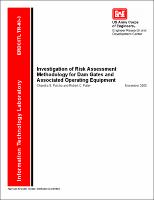Please use this identifier to cite or link to this item:
https://hdl.handle.net/11681/10881Full metadata record
| DC Field | Value | Language |
|---|---|---|
| dc.contributor.author | Putcha, Chandra S. | - |
| dc.contributor.author | Patev, Robert C. | - |
| dc.date.accessioned | 2016-06-20T14:08:01Z | - |
| dc.date.available | 2016-06-20T14:08:01Z | - |
| dc.date.issued | 2000-11 | - |
| dc.identifier.uri | http://hdl.handle.net/11681/10881 | - |
| dc.description | Technical Report | - |
| dc.description | Abstract: This report deals with investigation of risk assessment methodologies, existing in literature, pertaining to dam gates and associated operating equipment conducted in Phase I of this research. More than 60 references have been studied in detail as part of the work. Based on this, five methods have been identified as potential methods for risk assessment of dam gates. These are: Dekay and McClelland (1993), Cheng et al. (1986), Lafitte (1993), Lafitte (1996), Kreuzer and Bury (1984). Dekay and McClelland (1993) proposed a method for predicting Loss of Life (LOL) resulting from dam failures and flash floods. An empirical equation has been derived for LOL in terms of Population At Risk (PAR), Warning Time (WT) and Forcefulness of Flood Waters (FORCE). Cheng et al. (1986) propose calculation of probability of failure due to any cause using Advanced First Order Second Moment (AFOSM) method for the formulated performance function. Lafitte (1993) proposed an equation for calculation of Reliability (R) in terms of probability of occurrence of the undesirable event (P), and the probable extent of the damage caused (D) and a risk consequence factor (α). Lafitte (1996) proposed a method for classifying the risk for dams based on the calculation of the global factor for each dam. The method incorporates the General Conditions of the Site (CGS), condition of the structure (CO), and socio-economic conditions downstream of dam (CSE). Kreuzer and Bury (1986) discussed a procedure using safety criterion, treatment of data uncertainty and choice of probability density function. The final recommended method is the one proposed by Lafitte (1993). Phase II will focus on implementation of method proposed by Lafitte (1993) to an actual dam gate and associated operating equipment. | - |
| dc.publisher | Information Technology Laboratory (U.S.) | - |
| dc.publisher | Engineer Research and Development Center (U.S.) | - |
| dc.relation | http://acwc.sdp.sirsi.net/client/en_US/search/asset/1003630 | - |
| dc.relation.ispartofseries | ERDC/ITL TR 00-3. | - |
| dc.rights | Approved for public release; distribution is unlimited. | - |
| dc.source | This Digital Resource was created in Microsoft Word and Adobe Acrobat | - |
| dc.subject | Assessment | - |
| dc.subject | Dams | - |
| dc.subject | Density function | - |
| dc.subject | Dependency | - |
| dc.subject | Gates | - |
| dc.subject | Interdependencies | - |
| dc.subject | Overtopping | - |
| dc.subject | Probability | - |
| dc.subject | Reliability | - |
| dc.subject | Reservoir | - |
| dc.subject | Risk | - |
| dc.subject | Safety | - |
| dc.subject | Systems | - |
| dc.title | Investigation of risk assessment methodology for dam gates and associated operating equipment | - |
| dc.type | Report | en_US |
| Appears in Collections: | Technical Report | |
